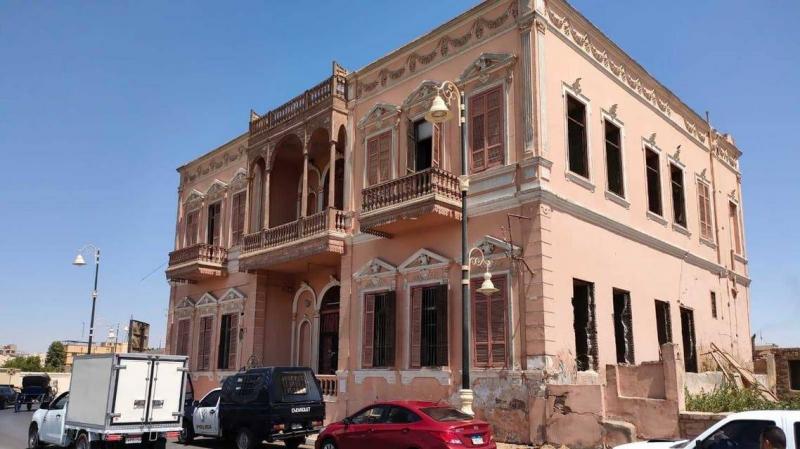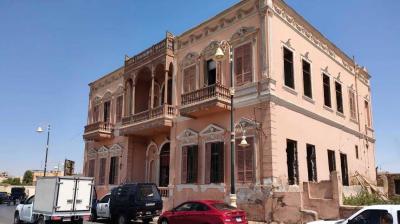The demolition of the historic "Andrawus Palace" in Luxor (Southern Egypt) has sparked significant uproar and criticism among specialists in archaeology and heritage, mourning the fate of the palace, which witnessed important events in the country's history. They asserted that it could have been restored and preserved instead of being destroyed. The Andrawus Palace dates back to 1897, constructed behind the Luxor Temple, facing the Nile River, and hosted many prominent figures, including leader Saad Zaghloul during the 1919 revolution.
The controversy began with the circulation of images showing workers and demolition equipment around the palace of Tawfik Pasha Andrawus, located within the precincts of the Luxor Temple. Many initially thought that it was an attempt to clean the palace grounds of debris, until it was confirmed that the equipment was meant for demolishing the palace.
Dr. Monica Hanna, acting dean of the Faculty of Archaeology at the Arab Academy for Science, Technology, and Maritime Transport, expressed her astonishment at the decision to demolish the palace, stating that "the Andrawus Palace was a witness to significant historical events and was the residence that Saad Zaghloul took in Luxor, even naming it ‘The House of the Nation’ in Luxor," asking, "How can a palace of such value be demolished?!" according to "Asharq Al-Awsat."
Dr. Suhair Hawass, a professor of architecture and urban design at Cairo University and a board member of the Urban Coordination Authority under the Egyptian Ministry of Culture, agreed with her, stating that "the palace is a cultural and historical heritage that should not be demolished," questioning the benefit of destroying a palace of such historical significance.
It is notable that attempts to demolish the palace began in 2009, as confirmed by Samir Gharib, former head of the Urban Coordination Authority, who stated that during that time, the Luxor governorate expressed its desire to demolish the palace, prompting the formation of a working group of experts in architecture and heritage to inspect it. They recommended against demolition. Following this, Farouk Hosni, the Minister of Culture, formed two committees to make a decision about the palace, both of which supported the decision not to demolish it. Gharib noted that "despite the governorate's insistence on demolition, a third committee was formed but this time comprised of engineers rather than heritage specialists, and it was this committee that made the initial decision to demolish the palace."
Moreover, Gharib mentioned that there were two adjacent palaces; the first was demolished by the third committee's decision, while the second, which was demolished on Sunday, remained. When the Luxor governor at that time was asked why the second palace was not demolished, he stated it was kept as a model of architectural heritage from that period.
Hawass indicated that she was a member of both the first and second committees formed in 2009 to examine the palace, and at that time she met with the daughters of Andrawus who lived in the palace and witnessed its contents. She stated, "The palace has historical and architectural value, but the problem is that issues like these are referred to the Ministry of Antiquities, which deals with Pharaonic, Islamic, and Coptic heritage, while heritage buildings fall under the Ministry of Culture and the Urban Coordination Authority."
The Luxor governorate demolished the palace based on a committee’s thesis indicating that the palace had become at risk of collapse due to the aftermath of an attempt by thieves to excavate for antiquities underneath the palace, which was uncovered last year, damaging the palace's foundations, according to local officials.
However, Hanna asserted that there is no building that is beyond restoration, and since the palace was made of mudbrick, it could have been restored, describing its demolition as a continuation of the Ministry of Tourism and Antiquities' policy that fails to appreciate the value of Egypt's diverse heritage.
For her part, Hawass commented that using the term "about to collapse" is an attempt to circumvent the law that protects buildings not at risk of collapse, emphasizing that any building can be restored.
The palace witnessed a murder crime in 2013 when the bodies of the daughters of Andrawus (Sophie, 82, and Ludi, 84) were found murdered inside it. Last year, an attempt was made to illegally excavate for antiquities on its grounds, leading to its closure under the pretext that it was at risk of collapse.




